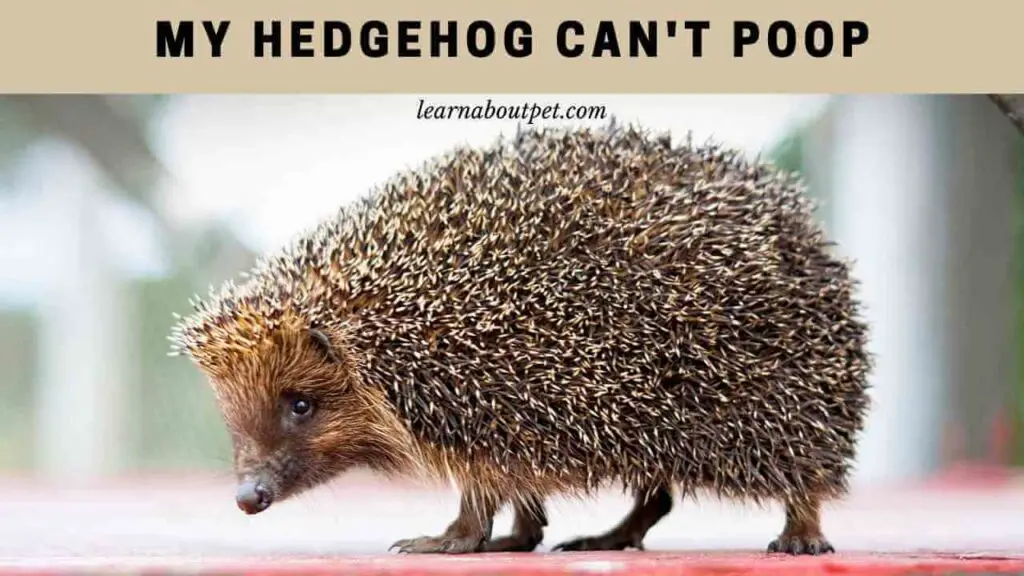Discovering that your hedgehog isn’t pooping is sure to cause you a great deal of concern. You will definitely want to know about the things that can make a hedgehog stop pooping, whether it is a normal thing, and what you can do about it. Read on, for answers to all those and other related questions.
What does it mean if my hedgehog can’t poop? In most cases, it means that the hedgehog has constipation. But it can also mean that the hedgehog is experiencing fecal impaction, possibly even a complete gastrointestinal obstruction. In terms of the underlying reason, the hedgehog may be stressed, dehydrated or ill.
Of course, it is important to ascertain that the hedgehog is indeed not pooping. You may be looking at a complex situation: where the hedgehog is pooping, then proceeding to eat its own poop. Or you may be looking at a situation where the hedgehog is pooping, but at an unexpected place.

Where it is clear that the hedgehog is not pooping, giving it a bath or wheeling may help get it to start pooping again. But there are also cases where a hedgehog that won’t poop requires veterinary attention.
My Hedgehog Can’t Poop – What Are The Possible Reasons?
If my hedgehog can’t poop, one possibility to look into is that of it being due to constipation. This constipation may be as a result of the hedgie eating certain types of foods. It may also be on account of the hedgie not getting enough hydration or enough exercise. It could also be due to stress.
At another level, if my hedgehog can’t poop, another possibility to look into is that of it being due to fecal impaction. This is where a mass of feces that is both large and hard gets stuck in the hedgie’s colon. This may be a complication from what initially was simple constipation.
Further still, if my hedgie can’t poop, there would be the even bleaker possibility of it being due to a complete gastrointestinal obstruction.
In trying to figure out for sure why my hedgehog can’t poop, it is essential to consider how long the problem has persisted. A situation where my hedgehog can’t poop for a day is obviously very different from another one where my hedgehog can’t poop for a week…
Another consideration is whether the hedgehog is eating or not. A situation where my hedgehog can’t poop, yet it is eating has different implications from one where the hedgehog is neither eating nor pooping.
Where the hedgehog is neither eating nor pooping, the chain would be longer. It will probably mean that there is something affecting the hedgehog’s appetite (stress, illness, parasite infection and so on). And because the hedgie has no appetite, it doesn’t eat. And because it doesn’t eat, it ends up with nothing to poop.
All in all, if a hedgehog can’t poop, those are the key possible reasons.
Do Hedgehogs Poop A Lot?
In trying to put a situation where my hedgehog can’t poop into context, it is important to first find out whether hedgehogs normally poop a lot. So, do hedgehogs poop a lot (normally)? The answer is ‘yes’. Hedgehogs poop a lot. And this makes sense, given how fast their metabolism is.
Now given that hedgehogs poop a lot, a situation where you have yours going for days without pooping should be reason for concern. At the most basic level, I would take this to mean that my hedgehog is constipated. This is the fundamental observation in a situation where my hedgehog isn’t pooping as often/as much as it should. But this then leads to other questions, like what may exactly be causing the constipation.
All in all, hedgehogs do poop a lot. Therefore having a hedgehog that is going for long durations of time without pooping should be cause for concern.
How Often Do Hedgehogs Poop?
In trying to put a situation where my hedgehog can’t poop into context, another key pillar is to understand how often hedgehogs poop. So, indeed, how often do hedgehogs poop? The answer is ‘very often’. When they are very young, hedgies are actually referred to as ‘poop machines’. This is because they poop very often, and pretty much everywhere. It is not uncommon for a baby hedgie to poop as many as 5-7 times a day.
Even adult hedgies poop a lot: typically in the 2-3 times per day range. And each dump has quite a lot of poop in it. So folks who keep hedgies end up with considerable mass of poop around: which often leads to the question – is hedgehog poop dangerous to have around? And unfortunately, the answer is ‘yes’ – mostly due to the salmonella that is often in the hedgie poo.
So the bottom-line here is that hedgehogs poop quite often. And the upshot is that if you have a hedgie that is going for very long (say days) without pooping, that should be a very real source of concern.
Why Is My Hedgehog Pooping Less?
Sometimes, rather than having a situation where my hedgehog can’t poop completely, what may be at play is a case where the hedgie poops less than it normally does. So you find that the hedgehog is still pooping. But the poop is less than normal. And this too can arouse a bit of worry.
One possibility is that there has been a change in the hedgehog’s diet. Some foods may make a hedgehog poop less. Another possibility is that of constipation. A hedgehog with constipation may not stop pooping altogether. But it may poop less.
It is also worth remembering that very young hedgehogs produce a lot of poop. That is why sometimes people refer to them as ‘poop machines’. But as they mature, they start pooping less. This is normal. And if this is what is happening in your case, then there may be no reason for worry.
Ultimately, you may need to check through the ‘less’ poop that the hedgie is producing, to understand if indeed there is a problem. For instance, if it is less in quantity, and there seems to be hedgehog blood in stool, it could be an indication of something wrong. Even hedgehog mucus poop (including the so-called hedgehog stress poop) can be cause for concern.
Further, besides looking at the quantity, you may also check the hedgehog poop color. Also consider, what does hedgehog poop smell like in this case? All these things will give you clues on whether the less poop quantity that your hedgie is producing is normal or cause for concern.

New Hedgehog Not Pooping – What Are The Possible Reasons?
If you have a new hedgehog, and it is not pooping, then this may be due to the stress of being in a new environment. Indeed, when a hedgie is in a new environment, it will often not even eat. This in turn means that it has nothing to poop. Therefore for a new hedgehog pooping less (or not pooping at all initially) may be expectable.
Still, if the scenario where the new hedgehog won’t poop continues for more than the first 2-3 days, it should be cause for concern. You may want to consider using various measures, such as wheeling, bathing or feeding with laxative foods (such as pumpkin puree), to get it pooping.
Hedgehog Not Pooping Or Peeing – What Are The Possible Reasons?
Where my hedgehog can’t poop or pee, one possibility to look at is that of it being due to dehydration. Hedgies with severe dehydration eventually get to a point where they are unable to poop or pee. At this point, you may ask, how do you know if a hedgehog is dehydrated? And the answer is that there are many ways – including pulling on a few of the spikes and checking how fast the skin goes back to normal.
All in all dehydration is one possible reason for hedgehog neither pooping nor peeing. Another possibility is that of it being due to an illness. If an illness is severe enough, it can eventually get to a point where the hedgie won’t poop or eat.
And this would possibly be near the point of death, when the body is shutting down. Indeed, while researching on how do you know if a hedgehog is dying, this is one of the signs you may find.
Of course, if the hedgie in question is a new one, it may be in the process of acclimatizing to the new environment. In that case, it may go for a while, before starting to poop and pee as usual. Severe stress – including that which is due to major temperature changes – may also cause a hedgie not to pee or poop for a while.
But the major common possible reasons for a hedgie not pooping or peeing are typically dehydration and illness.
My Hedgehog Can’t Poop – When Should I Start Getting Worried?
One situation where I would start to get worried is where my hedgehog can’t poop for more than 2-3 days. While it may sometimes be normal for a hedgie to go for a day without pooping, going for more than 2-3 days should be reason for a bit of worry.
Another situation to worry would be where my hedgehog can’t poop, even when it is wheeled, bathed and given foods that are known to be laxatives. It may mean that there is an impaction or another sort of obstruction that requires urgent veterinary attention.
Yet another situation to worry about is where my hedgehog can’t poop, and is having other disturbing signs such as lethargy. This is also where one may have concerns on, say, why is my hedgehog not coming out of her ball, and not pooping? Or why is my hedgehog bloated and not pooping? All such situations – where the hedgie isn’t pooping, and also has other disturbing symptoms that should be cause for great concern.
My Hedgehog Isn’t Pooping – What To Do?
One approach you can use is that of giving the hedgie foods that are known to have a natural laxative effective. For instance, syringe feeding the hedgie with pumpkin puree may get it pooping again.
Another approach that works quite well is that of wheeling the hedgie. We all know that hedgies tend to poop when they are on their wheels. So getting the hedgie to run on its wheel may be all you have to do, to get it to poop.
There is also the approach where you get the hedgie into a bath. The bath water has to reach the hedgie’s stomach level. This may cause its muscles to relax, ultimately leading it to poop.
You of course also need to ensure that the hedgie gets proper hydration consistently. This will get it to continue pooping properly consistently.
Further, ensure that the hedgehog gets a fiber-rich diet on an ongoing basis.
Where all your attempts to get the hedgehog to start pooping again don’t bear fruit, rush him to a vet immediately. Indeed, your attempts to get the hedgehog to start pooping again need to move fast. Ideally, you should try all those things within one or two days. If by day 3 the hedgie is still not pooping, have a vet check him immediately. The situation may be due to something like complete intestinal obstruction, which requires urgent veterinary attention.
Final Verdict – My Hedgehog Can’t Poop
As we have seen, where your hedgehog can’t poop, you are likely dealing with constipation. But it could also be something more complicated, like fecal impaction or even a complete GI blockage. At another level, you may be dealing with a situation where the hedgie is pooping, then going ahead to eat its own poop. Or where the hedgie is still pooping, but at unexpected spots. At another level, something may be affecting the hedgie’s appetite. So that hedgie can’t eat, and therefore has nothing to poop…
You may need to feed the hedgie with foods that have a natural laxative effect (such as pumpkin puree), to see if the situation improves. You also need to ensure that the hedgie generally gets a fiber-rich diet.

And you need to ensure that the hedgie is properly hydrated. Bathing and wheeling are other measures that can help a hedgie that wasn’t pooping to start doing so again. But where the situation where the hedgie can’t poop seems to persist, it is best to consult a vet urgently.
As a pet lover, make sure to learn about pet more and give your pet hedgehog a good and comfortable life!

Welcome to Learn About Pet. My name is Rajkumar Ravichandran and I love all pets, travel, and amazing food. I write about my passion and personal experience caring for multiple pets in this blog! ❤️
Post Disclaimer
DISCLAIMER: THIS BLOG OR WEBSITE, "Learn About Pet", DOES NOT PROVIDE YOU WITH MEDICAL ADVICE AND IS NOT A SUBSTITUTE FOR MEDICAL ADVICE. ALWAYS GET IN TOUCH WITH YOUR PERSONAL VETERINARIAN AND USE INFORMATION HERE AS GENERAL ADVICE.
The information, including but not limited to, text, graphics, images and other material contained on this website are for informational purposes only. No material on this site is intended to be a substitute for professional veterinary advice, food recommendation, diagnosis, or treatment. Always seek the advice of your veterinarian or other qualified health care provider with any questions you may have regarding a medical condition or for pet food related questions.







